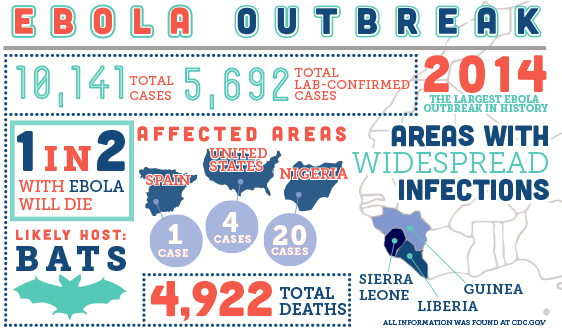Ebola spreads internationally

CDC seeks ways to prevent the deadly virus from killing more U.S. citizens

Outbreak — The CDC is directing its efforts toward containing the Ebola disease, which has claimed the lives of nearly 5,000 people. Photo credit: Bre Black
Ebola, an infectious disease commonly marked by fever and internal bleeding that is believed to be originally transmitted by bats in West Africa, has infected 10,141 people and has taken the lives of 4,922 others, according to the Center for Disease Control (CDC). The infection has spread to Guinea, Liberia, Nigeria, Senegal, Sierra Leone and now the United States.
“The reason I think it’s a concern here in the States is because we’ve never had Ebola on American soil,” Dr. Andrew Fabich, a professor of microbiology at Liberty University, said of the virus. “We have never had a case of Ebola in North America, in all of the Americas.”
According to several reports, both Senegal and Nigeria have been declared Ebola-free. However, the United States has not eliminated the virus — there are now three confirmed cases. Ebola entered Dallas, Texas, through now-deceased Thomas Eric Duncan, a Liberian man, and has since infected two Dallas nurses who worked with Duncan and a Doctors Without Borders medical aid worker in New York City.
Several news outlets have reported that the two nurses, Amber Vinson and Nina Pham, are now free of the Ebola virus. Fabich, like many doctors and researchers still unsure of what exactly is making these individuals better, said surviving Ebola is a “miracle of God.”
Many credit the blood and plasma donations of Dr. Kent Brantly, a Samaritan’s Purse doctor who contracted the virus while working in West Africa and was cured of the disease after weeks of treatment in the U.S., as partially responsible for Pham’s recovery. However, research as to how much of a role the donations played is inconclusive.
Earlier this month, President Barack Obama met with CDC officials and other medical professionals to address the viral outbreak and announced his appointment of Ron Klain, who served as Vice President Joe Biden’s chief of staff, as the official point person for White House administration’s efforts to fight the virus.
“The CDC has done a really good job overall with this,” Fabich said.
As major concerns mount, possibilities of the spread of Ebola continue to emerge. Fabich believes the best route to recovery from this infection is isolation and quarantine. The disease is not airborne, but it requires very little contact to spread.
In response to the diagnosis of Dr. Craig Spencer, a Doctors Without Borders medical worker, both New Jersey Gov. Chris Christie and New York Gov. Andrew Cuomo have issued mandatory Ebola quarantine orders.
The White House has urged the governors to withdraw these quarantine policies, according to the New York Times.
Dr. Anthony Fauci, director of the National Institute of Allergy and Infectious Diseases, described the quarantines as “draconian” in his appearance on NBC’s “Meet the Press” Oct. 26.
“A lot of Americans don’t like the idea of quarantine,” Fabich said. “I think quarantine is necessary when you’re dealing with something that’s so deadly. … It’s not airborne. (However), it has a low infectious dose. You don’t need a lot of it to get sick. Since you don’t need a lot of it to get sick, that means you will very likely get sick if you come in contact with those bodily fluids.”
The Dallas nurses were wearing protective suits. However, according to Fabich, a small amount of the virus — even from a cough — can soak through the protective gear if it is not thick enough.
“If it gets on you, my impression is, you’ve got it,” Fabich said of contracting the virus.
According to both Fabich and the CDC website, if you have been exposed to Ebola or have been in an environment near someone infected with the virus, you need to monitor your temperature for 21 days. Should you contract any fever or Ebola-like symptoms, including nausea, vomiting and diarrhea, you need to quarantine yourself and call the hospital immediately.
Fabich warned that if you feel you may be at risk or might have been exposed, go straight to the emergency room. Do not wait for an appointment with your primary care physician — that will expose more people to the virus. Additionally, your primary care physician is not prepared to treat an infection like Ebola.
“(Ebola) is no respecter of persons,” Fabich said. “Modern medicine can’t save everybody, but you shouldn’t neglect it.”
For more information on Ebola, precautions to take and updates on the infections around the world, visit cdc.gov/vhf/ebola.
Goins-phillips is the opinion editor.
